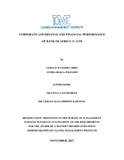Corporate Governance and Financial Performance of Bank of Africa (U) Ltd
Abstract
From Bank of Africa report (September 2015) ,it was insinuated that Bank of Africa seems to have put in place formidable corporate governance structure to enable the bank perform better financially but liquidity risk arose from the possible inability of the bank to accommodate decrease in liabilities, Loan loss provision to total loans, poor expenses management, interest expenses, deposit mobilization in Uganda, large interest rate, market power and concentration, operational costs, taxation and core capital requirement and other factors have reduced the bank profitability, liquidity flow and return on investment thus affecting financial performance of the bank yet the bank.
It’s from the study that the researcher came up with the following objectives; examinig effects of the Board structure, ascertaining the effects of ,determining the effects of Management Role on financial performance of Bank of Africa. The research adopted the agency theory in this study because it links relationship between principals (owners), management (agents) hired by owners and employees hired by management.
Descriptive survey study design used quantitative and qualitative approaches to capture views, attitude and opinions of responds. Interview guide was used as the qualitative and questionnaire as the quantitative instrument. The population involved 120 employees of Bank of Africa and the sample size was 92. Purposive and convenience, were applied for respondents like the Managing Director and Heads of Departments who were to be seen at their own availability and convenience, stratified was used in order to obtain a representative sample and simple random sampling techniques were used for selection of respondents randomly because respondents had equal chances of being selected. The study revealed a number of findings including: Board structure , Ownership and Management Role all have effect on dependent variable. It’s recommended that: There is need to improve board structure by widening the board members to include some employees and they should be independent in making decisions affecting performance of the bank instead of working under shareholders’ influence, there is need to expand ownership structure by going public in order to widen capital base of the bank and also include more wealthier, knowledgeable and experienced owners in the business, Management needs to move away from old type of management of planning, organizing, coordinating and controlling to practice modern management approach as mentioned by Mintzberg.

